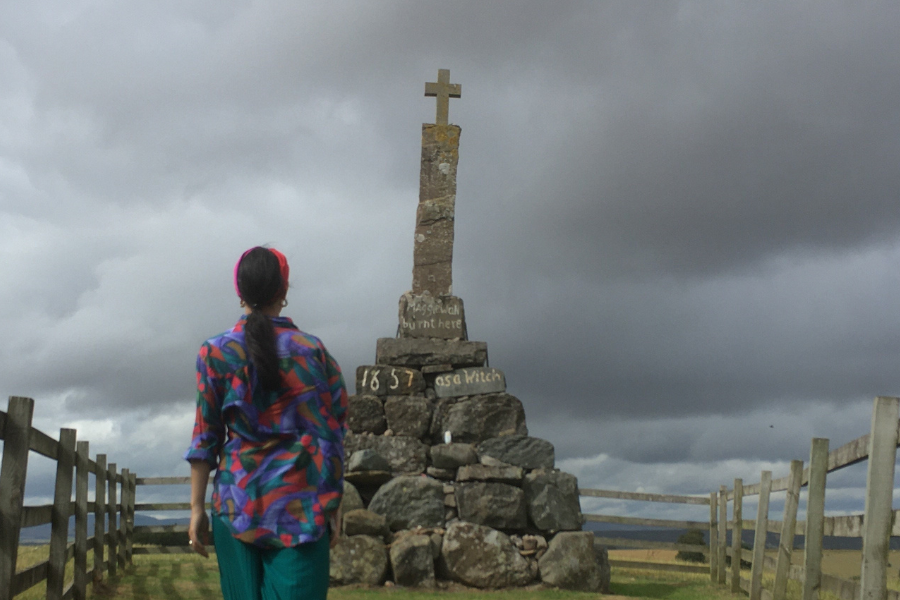
LESS than a mile outside the Perthshire village of Dunning stands a memorial to Maggie Wall, a woman who, the inscription on the stone monument claims, was “burnt as a witch” on the site in 1657. At least six women are believed to have been executed as witches near Dunning at this time, but none of them are recorded as having the name Maggie Wall.
An enduring Scottish myth, the execution of Maggie Wall is the subject of a new play by actor- turned-playwright Martin McCormick. Titled simply The Maggie Wall (after the memorial’s nickname), the piece will premiere next month at the new studio at Pitlochry Festival Theatre (PFT).
McCormick – who resides in Perthshire these days – became intrigued about the memorial when he discovered that there are no records of a woman named Maggie Wall ever having been tried and executed as a witch. “I just found it really interesting that this memorial still exists and is still maintained,” the writer explains.
It is, indeed, strange that the Maggie Wall memorial has endured, despite the absence of any official record of the trial or the execution. Stranger still, says McCormick, there is a “weird, macabre” aspect to the enduring myth around the story.
“A lot of evil people in recent history have been drawn to the memorial,” he continues. “[The Moors Murderers] Ian Brady and Myra Hindley were obsessed with it, and photographed themselves on it.”
There was also, the playwright notes, a recent, horrifying murder in which the killer dragged his female victim’s body to the memorial.
McCormick’s first considerations of the Maggie Wall memorial and of the mythology around it coincided with the sickening kidnap, rape and murder of Sarah Everard in March of last year, which was perpetrated by serving Metropolitan Police officer Wayne Couzens. For the playwright, the two stories, separated by 365 years, are appalling evidence of an extreme misogynistic violence in our society.
“There are parallels,” says the writer, between the two cases that drew him towards the idea of a dramatic monologue for Maggie Wall that would speak to the 21st century. He wanted, he says, “to give this woman a voice, if she ever existed”.
More than that, given the absence of any official record of the Maggie Wall case, McCormick “wanted to give the situation a voice”. Consequently, his play – a monologue to be performed by acclaimed actor Blythe Jandoo – will seek to imagine both Wall’s character and the circumstances that might, ultimately, have led to her being branded – and then killed – as a witch.

In some ways, the dearth of information about Wall – indeed the lack of certainty about who she was or if she even existed – complicated matters for McCormick. However, it also gave him a considerable degree of freedom. “I’ve been able to take liberties,” he says.
Like a painter armed with just an idea and a blank canvas, the dramatist has been free to create a 17th-century character – and situation – effectively from scratch. However, inevitably – and not least due to the horrors of Couzens’s heinous crimes against Everard – the historical story is considered through the prism of our society today.
McCormick anticipates that the play will feel current for contemporary audiences. “Thematically, and in terms of the language that I’m using, I think it might prompt emotions in audiences.
“It might not be a particular thought or idea, but, rather, a feeling. Maybe something that chimes with their own personal experience.”
It is, perhaps, inevitable that a play that tries to imagine the thoughts and feelings of a victim of misogynistic persecution and violence – even one set more than three centuries ago – should speak to our own gender oppressive society. It is likely, the playwright acknowledges, that, as Jandoo unfurls the character and the situation of the imagined Wall, members of the Pitlochry audience will experience emotions connected with “personal trauma” or “societal guilt”.
ALTHOUGH he intends for his drama to speak to our times, McCormick is fascinated by the history of Perthshire and Scotland in the 17th century. Indeed, his historical research has uncovered an interesting suggestion as to who Wall actually was.
“There’s a hypothesis that Maggie Wall is a pseudonym for a lover of the laird at that time,” he explains. This speculative story would, he continues, become “the launchpad” for his play.
This element of the Maggie Wall myth intersected with another aspect in the writer’s research. He was interested to read that, in this period in history, “Scotland functioned as a kind of funnel for people who travelled in Europe, because you couldn’t actually get any further north”.
There is an idea, McCormick continues, that “all the waifs and strays of Europe ended up in Scotland.” This led him to develop a “third thread” to his play (besides the tale of Wall’s execution and its connection to women’s oppression today).
That thread is the playwright’s speculation that Wall might not have been Scottish but rather had travelled from somewhere in continental Europe. Consequently, the drama’s protagonist “looks slightly different” from the Scottish people around her.
The notion of Wall being a victim, not only of misogynistic superstition, but also xenophobic fear of the outsider, is a powerful one. “It’s about all the things that would point to her being different,” the writer comments, “or would lead to her being victimised or enable a society to be whipped up into a frenzy.”
THE idea of someone being killed as a consequence of a paroxysm of violent racism is, says McCormick, “another scary parallel that hasn’t gone away.”
It is in the nature of myth that it lends itself to multiple narratives and numerous contemporary resonances. It is a tribute to McCormick that he has constructed such a multi-faceted and coherent new story from the Maggie Wall myth.
It is also an encouraging sign of the possibilities of PFT’s new studio theatre that this story is being told in Pitlochry.
The Maggie Wall plays at the Pitlochry Festival Theatre studio on various dates, September 9-29: pitlochryfestivaltheatre.com







